Via Robin Good
Get Started for FREE
Sign up with Facebook Sign up with X
I don't have a Facebook or a X account
 Your new post is loading... Your new post is loading...
 Your new post is loading... Your new post is loading...

Alfredo Corell's curator insight,
October 3, 2013 5:48 PM
An excellent story for lecturers or teachers thinking in content curation as a tool in their aulas. 
Fiona Harvey's curator insight,
October 8, 2013 2:22 AM
Useful for educators - key digital literacy skill 
johanna krijnsen's curator insight,
December 4, 2013 2:00 PM
content curation and critical thinking skills

Alfredo Corell's curator insight,
June 7, 2013 6:44 PM
An expert always provides feedback on the next steps....
A facilitator... facilitates the student to learn from peer feedback and self reflection 
Begoña Iturgaitz's curator insight,
June 13, 2013 11:44 AM
focus on chart. The other ideas are the ones we've been dealing with for...ten years? Nire iritziz taula da interesgarriena. Gainerako ideiek +10 urte? dauzkate.

Andrea Walker's curator insight,
May 17, 2013 10:56 PM
By using lists lists and hash tags effectively twitter can be u useful curation tool. Storify another mentioned in this article could also be a useful tool to curate twitter content 
Andreas Kuswara's comment,
June 11, 2013 9:22 PM
I supposed twitter can be used or any tool can be used for anything,but some tools are made with certain intended affordance by the creator that would make the tool less effective for certain functions. curation in a way is capturing things void of time (i probably drawing too much from museum), while twitter is fast pace timeline of interactive (or one way) discourse.... they seems to be inherently different.
i'm just automatically sceptical when 'one tool can be use for all' theme appear. but it is an interesting suggestion.
Sample Student's curator insight,
May 5, 2015 10:14 PM
We often ask our students to create annotated bibliographies, and this focuses on their capacity to evaluate and make decisions about the validity, reliability and relevance of sources they have found. using Scoop.it, we can ask them to do much the same thing, but they will publish their ideas for an audience, and will also be able to provide and use peer feedback to enhance and tighten up their thinking. This is relevant to any curriculum area. Of course it is dependent on schools being able to access any social media, but rather than thinking about what is impossible, perhaps we could start thinking about what is possible and lobbying for change.
Sample Student's curator insight,
May 5, 2015 10:18 PM
We often ask our students to create annotated bibliographies, and this focuses on their capacity to evaluate and make decisions about the validity, reliability and relevance of sources they have found. Using Scoop.it, we can ask them to do much the same thing. But they will publish their ideas for an audience, and will also be able to provide and use peer feedback to enhance and tighten up their thinking. This is relevant to any age, and any curriculum area. Of course it is dependent on schools being able to access social media. But rather than thinking about what is impossible, perhaps we should start thinking about what is possible, and lobbying for change. Could you use a Scoop.it collection as an assessment task? |

Robin Good's curator insight,
August 22, 2013 3:34 PM
Martin Couzins and Sam Burrogh introduce in simple words the importance of curation and its relationship with their story and work. How do we get to the information that is really useful? How do we get to it quickly? A good introduction for beginners. 7/10 Original video: http://youtu.be/qxm9ElX4jaM Check also the related article: http://learnpatch.com/2013/08/how-content-curation-can-help-transform-workplace-learning/

terrymc's curator insight,
September 23, 2013 10:21 AM
Curation can be used as an authentic activity with many disciplines to enable students to critically evaluate resources for a common interest. Would like to hear more about discipline based projects.

Karyn McGinley's curator insight,
October 22, 2013 7:13 PM
I am eager to delve into this further....

Robin Good's curator insight,
June 4, 2013 1:46 PM
Audio excerpt: https://soundcloud.com/user458849/curation-and-search-joel Full interview: http://valueofsimple.com/smart-and-simple-matters-podcast-023-with-robin-good/ MP3 full interview: http://traffic.libsyn.com/valueofsimple/023_SmartAndSimpleMattersPodcastFromValueOfSimple.mp3 Subscribe to iTunes podcast: http://valueofsimple.com/itunes

wanderingsalsero's curator insight,
May 23, 2013 8:37 PM
This is an evergreen interesting topic. I was especially intrigued with the title up above that said "Social Media Job of The Future". There might be a lot of prescience (sp?) in that choice of words. 
Dawn Adams Miller's curator insight,
May 23, 2013 11:12 PM
Anything from LnD Dave is pure hold and very practical. Enjoy' 
Susan Wegmann's curator insight,
May 24, 2013 8:51 AM
A GREAT resource for the buzzword "Content Curation." Finally!

Robin Good's curator insight,
April 30, 2013 6:11 PM
The Avoca Learning platform is a web service which facilitates the finding, collection and organizing of vetted learning resources from dozens of the leading educational sites. The platform already offers over 20,000 resources from over 35 leading education sites. In the near future new educational resources in the fields of of Language Arts/Reading, and History/Social Studies will be added. Users can search the already vetted and curated resources and then collect and organize them into specific "albums" dedicated to specific topics. From the official site: "The Avoca Learning Platform brings together thousands of online learning resources that students, parents and teachers can search, manage and share. Whether you’re looking for a very specific resource for a single concept (equivalent fractions, for example) or a collection of content that’s aligned to an entire course, the Avoca Learning Platform provides a powerful curation engine to bring you the resources you need, when you need them." "Avoca Learning helps to solve that problem by finding and indexing the best digital content, allowing users to organize and save that content, and then making it easy to share that curated content with other users." Curated results can also be filtered by subjects, topics, resource type, media type and grade level. Free to use. Try it out now: http://avocalearning.com Video tutorial on how "search" works in Avoca: http://vimeo.com/63171301 How it works: http://www.avocalearning.com/how-it-works/ 
Raquel Oliveira's curator insight,
May 2, 2013 2:56 PM
Ferramenta para filtrar as informações relevantes da net e aprimorar a curadoria de conteúdo para fins de estudo ! Vale a consulta .

Jay Cross's comment,
August 12, 2012 5:58 PM
What I'm looking at in Robin's photo above:
http://farm4.staticflickr.com/3370/3261012227_45c70419f5_z.jpg & http://farm4.staticflickr.com/3492/3261841520_c64479f661_z.jpg Bellissima!
Sample Student's curator insight,
May 5, 2015 10:14 PM
We often ask our students to create annotated bibliographies, and this focuses on their capacity to evaluate and make decisions about the validity, reliability and relevance of sources they have found. using Scoop.it, we can ask them to do much the same thing, but they will publish their ideas for an audience, and will also be able to provide and use peer feedback to enhance and tighten up their thinking. This is relevant to any curriculum area. Of course it is dependent on schools being able to access any social media, but rather than thinking about what is impossible, perhaps we could start thinking about what is possible and lobbying for change.
Sample Student's curator insight,
May 5, 2015 10:18 PM
We often ask our students to create annotated bibliographies, and this focuses on their capacity to evaluate and make decisions about the validity, reliability and relevance of sources they have found. Using Scoop.it, we can ask them to do much the same thing. But they will publish their ideas for an audience, and will also be able to provide and use peer feedback to enhance and tighten up their thinking. This is relevant to any age, and any curriculum area. Of course it is dependent on schools being able to access social media. But rather than thinking about what is impossible, perhaps we should start thinking about what is possible, and lobbying for change. Could you use a Scoop.it collection as an assessment task? |




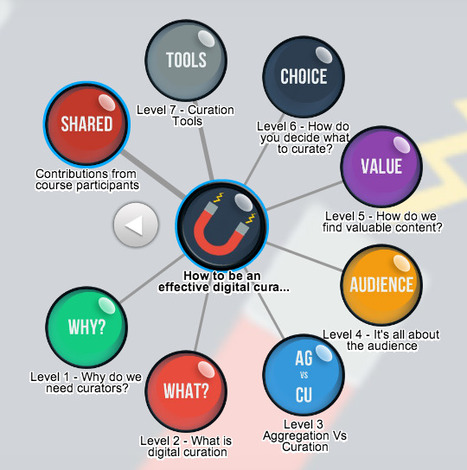

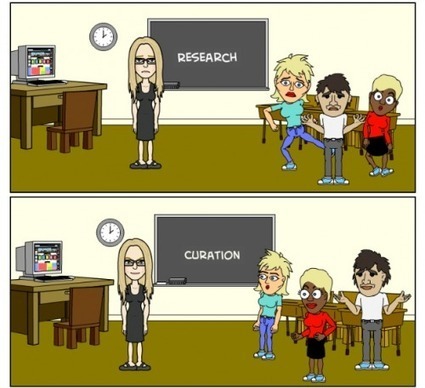



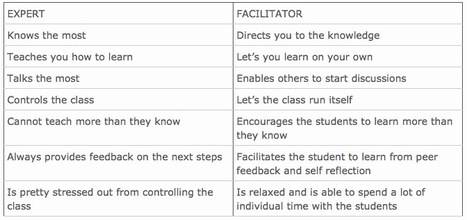

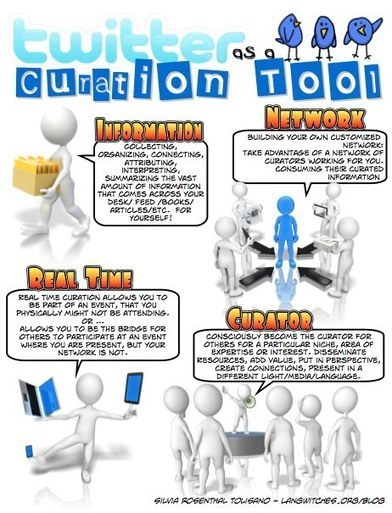


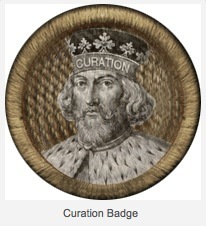
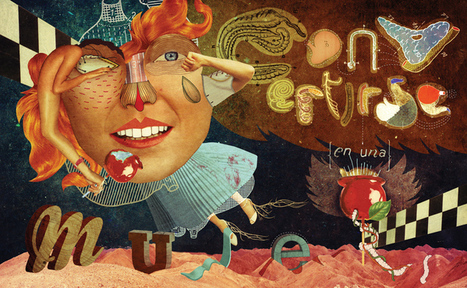



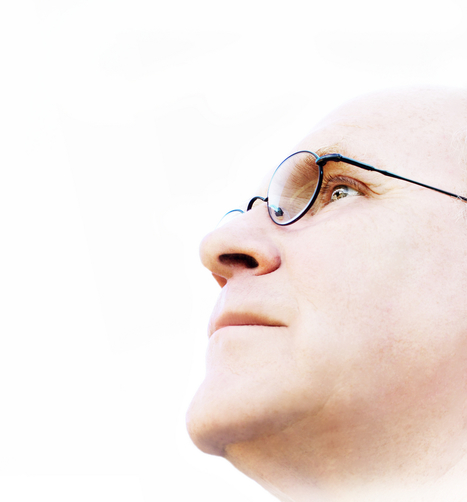

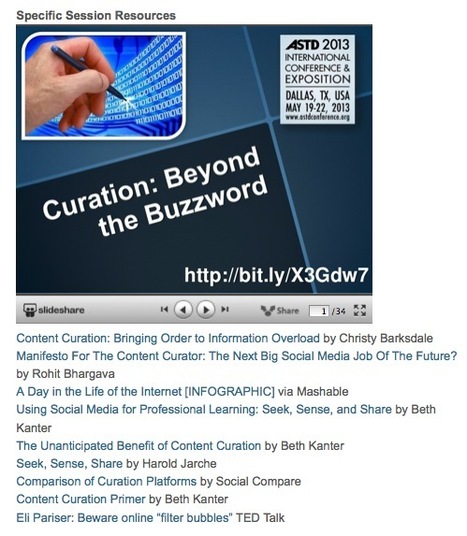
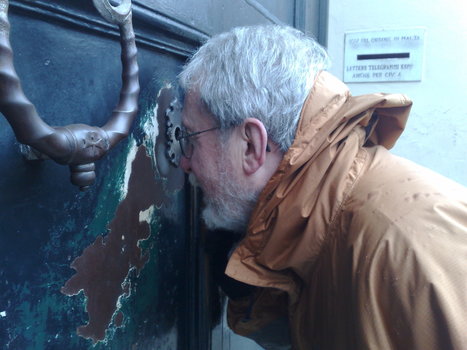
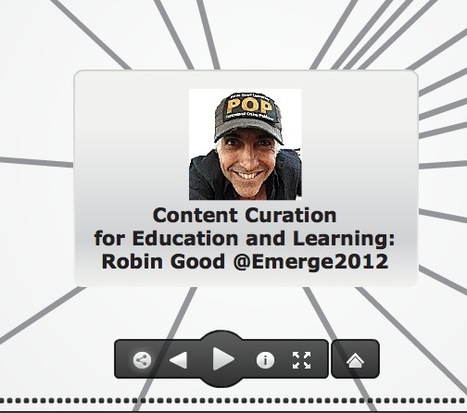





Traduco approssimativamente quanto scritto da Robin Good.
Una raccolta di risorse sulla content curation che raccoglie diversi articoli 60, (in lingua inglese) e li organizza in 8 categorie principali:
1. perché c'è bisogno della curation?
2. Che cos'è la digital curation?
3. aggregazione o curation?
4. tutto sull'audience
5. dove è possibile trovare contenuti di valore
6. che cosa selezionare?
7. strumenti di curation
8, contributi dei partecipanti del corso
Gli articoli sono stati ordinati in categorie utilizzando Pearltrees, questo lavoro rappresenta il risultato di un corso sulla content curation
Curate and scoop it- this one shows you how to curate effectively
Here's a valuable resource on content curation, "distilled" by the students of the DCurate MOOC lead Martin Couzins and Sam Burrough which organizes over 60 different articles, guides and tools on the topic.
This resources collection is presented in the form of a Pearltrees interactive map, organized into eight sections:
1. Why Do We Need Curators
2. What Is Digital Curation
3. Aggregation vs. Curation
4. It's All About Audience
5. How Do We Find Valuable Content
6. How Do You Decide What To Curate
7. Curation Tools
8. Contributions from participants
If you are new to content curation this is a good resource to bookmark and keep as a reference.
DCurate MOOC sign-up: http://www.curatr3.com/portfolio-item/how-to-be-an-effective-digital-curator/ ;
See also: http://sco.lt/99a09Z ;
Free to use.
Explore the guidemap: http://bit.ly/digitalcuratorguidemap ;
See also: https://gibbon.co/RobinGood/content-curation-guide ;